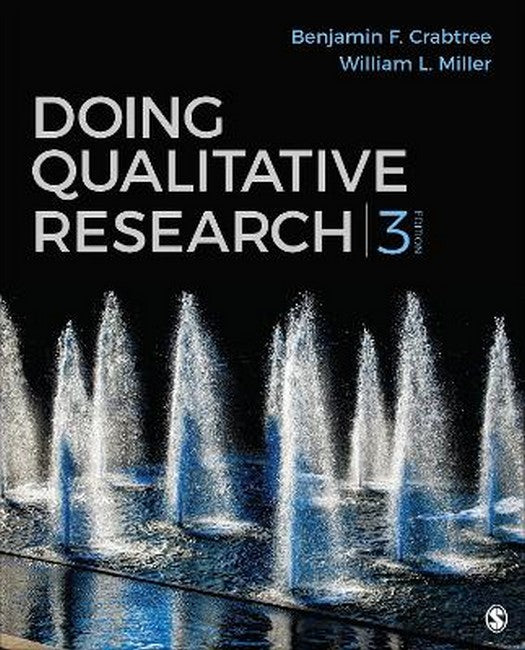Benjamin F. Crabtree, PhD, MA is a medical anthropologist and Distinguished Professor in the Department of Family Medicine and Community Health, Rutgers Robert Wood Johnson Medical School. He is a full member of the Rutgers Cancer Institute of New Jersey in the Cancer Prevention and Control Research Program. Ben earned his master's degree in applied anthropology from the University of South Florida and his doctorate in medical anthropology from the University of Connecticut. Prior to his current appointment, Ben was on the faculty of the departments of family medicine at the University of Connecticut and the University of Nebraska Medical Center. Ben has collaborated on many in-depth interview and focus group studies where he's learned to appreciate the experiences of illness and health care from the perspectives of both clinicians and patients. Ben's recent research focuses on quality of health care delivery, primary medical care practice organization, and organizational change. He has been principal investigator on five National Institutes of Health R01 grants that used qualitative methods and mixed-methods for enhancing quality of care in primary care practices. His current National Cancer Institute R01 grant engages diverse stakeholders in identifying actionable, practice-based activities for provision of long-term breast cancer survivorship care using depth interviews and then implements and evaluates an intervention for delivering care for breast cancer survivors in primary care. Ben has contributed to more than 225 peer-reviewed journal articles and numerous book chapters, and served as co-editor on two books, Doing Qualitative Research and Exploring Collaborative Research in Primary Care. In 2014, Ben and co-author Will Miller were jointly awarded the prestigious Curtis G. Hames Research Award for lifetime contributions to family medicine research. Ben volunteered twice with the United States Peace Corps, first in the Ethiopian Smallpox Eradication Program and then in the Korean National Tuberculosis Program. He completed his dissertation research in Korea conducting a mixed-methods study of rural birthing practices in the face of modern medicine. He and his wife Eiko travel extensively in Japan and enjoy talking long walks and gardening. William L. Miller, MD, MA is a family physician anthropologist and Chair Emeritus at the Lehigh Valley Health Network (LVHN), Department of Family Medicine in Allentown, Pennsylvania, and a Professor of Family Medicine at the University of South Florida Morsani School of Medicine for which LVHN serves as a branch campus. Will earned a master's degree in medical anthropology from Wake Forest University and received his medical degree from the University of North Carolina School of Medicine. After completing his family medicine residency at Harrisburg Hospital, Will entered private practice in Bethlehem, Pennsylvania where he honed his craft for four years. Prior to joining Lehigh Valley Health Network as the first Leonard Parker Pool Endowed Chair of Family Medicine, he was on the faculty in the Department of Family Medicine at the University of Connecticut. Will has been aptly nicknamed "coyote" for his propensity for "pushing the envelope," not only as an organizational leader, teacher, and clinician, but also in his research focused on observing, implementing, and evaluating NIH-funded national primary care practice improvement efforts along with investigations of healing relationships and the clinical encounter, collaborative care, and professional socialization. Some of this work has focused on how primary care practices respond to new innovations in care, with one of the outcomes being the development of the relationship-centered Practice Change Model. He was founding consulting editor for the Annals of Family Medicine, served a co-editor on two books, Doing Qualitative Research and Exploring Collaborative Research in Primary Care, and received, along with Ben Crabtree, the 2014 Curtis G. Hames Research Award for lifetime achievement in family medicine scholarship. He was an advisor and evaluator for the American Academy of Family Physicians' Future of Family Medicine National Demonstration Project of the patient-centered medical home and the American Board of Family Medicine-funded national family medicine residency redesign initiative. His special joys are family, getting lost in the woods with his grandson, cross-country skiing, and music.
Request Academic Copy
Please copy the ISBN for submitting review copy form
Description
PART I: Read Me First: Overview of Qualitative Research Chapter 1 - Clinical Research: A Qualitative Trail Map within a Mixed-Methods World Chapter 2 - Creating Collaborative Space and Research Teams Chapter 3 - Reflexivity Chapter 4 - Research Design: Start with the Stories PART II: Discovery: Data Collection Strategies Chapter 5 - Depth Interviews Chapter 6 - Group Interviews and Focus Groups Chapter 7 - Observation Chapter 8 - Key Informant Interviews Chapter 9 - Material Artifacts PART III: Analysis and Interpretation Strategies Chapter 10 - The Dance of Interpretation and Frustrations of Sisyphus Chapter 11 - Editing Organizing Style of Analysis Chapter 12 - Template Organizing Style of Analysis Chapter 13 - Immersion/Crystallization Organizing Style of Analysis Chapter 14 - Computers and Data management PART IV: Special Applications Chapter 15 - Case Studies Chapter 16 - Qualitative Methods in Intervention Studies Chapter 17 - Qualitative Methods in Participatory Healthcare Research PART V. The Rest of the Story Chapter 18 - Doing Good Qualitative Research Chapter 19 - Getting Funded & Getting Published Chapter 20 - The Future of Qualitative Methods in a Mixed-Methods World

